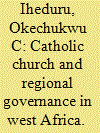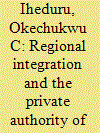| Srl | Item |
| 1 |
ID:
191730


|
|
|
|
|
| Summary/Abstract |
‘Catholic regionalism’ in west Africa exemplifies the capacity of theological claims and theologically informed actors to influence regional governance and international affairs. It is driven by four mutually reinforcing factors: interfaith competition for policy influence and followership, shrinking domestic political space for civil society organizations (CSOs), and de-secularization/counter-secularization pressures (all of which have substantially diminished the church's erstwhile influence); as well as Economic Community of West African States (ECOWAS) reforms granting ‘access’ to CSOs in regional policy. Through a strategy of ‘fateful compromise’ with regional states, the church has, more than its counterparts, developed substantial capacity to influence how regional integration organizations frame and implement policy in Africa. The empirical evidence is derived from fieldwork interviews on the activities of church leaders, namely the bishops represented by the Regional Catholic Episcopal Conference of West Africa (RECOWA); the Catholic bishops’ conferences in Ghana and Nigeria, where interfaith hegemonic competition is most intense; and ECOWAS Commission bureaucrats. The article enriches the ‘new regionalism’ framework with a template to better understand the regional governance activities of Africa's faith-based actors; and contributes to the literature by introducing the concept of ‘fateful compromise’ suggesting multiple trajectories in church-state relations, contrary to the presumption of inevitable ‘elite cooptation’ of social forces as the only option for inclusive or collaborative governance in societies experiencing regression in democracy.
|
|
|
|
|
|
|
|
|
|
|
|
|
|
|
|
| 2 |
ID:
113750


|
|
|
|
|
| Publication |
2012.
|
| Summary/Abstract |
A lacuna in the networked global economy and private regulatory authority literatures-hence the main theoretical contribution of this article-involves situations where regulatory authority is ceded or outsourced to nonstate business actors that, in addition to their commercial mission, espouse and actually integrate their profit motive with political and economic missions that can enhance or undermine regional integration effectiveness. Such identity-based, dual-mission regional business actors are more likely to promote regional economic integration than their foreign counterparts because these firms often define the region as the centerpiece of their investment decisions. The melding of their "region-centricity" with the profit motive may suggest the capacity of states and nonstate actors to "tame" or "regionalize" globalization or even challenge the existing global order. The empirical evidence is drawn from an unlikely source, that is, cross-border, dual-mission regional banks in West Africa to whom governments and INGOs have ceded or "outsourced" critical central banking regulatory authority, empowering or enabling them to (i) act as regional development banks through public-private partnerships; (ii) create and regulate financial instruments as surrogate common currency and regional payments systems; and (iii) cross-border supervision of regional bank subsidiaries and branches. Expanded private authority of regional banks is creating putative region-wide norms of financial integration and behavioral changes among banks and other sectors and governments while amplifying the limits of private-sector-led financial integration. The study fills a gap in the comparative regionalism literature that continues to neglect, misidentify, or undervalue the African experience.
|
|
|
|
|
|
|
|
|
|
|
|
|
|
|
|
| 3 |
ID:
082665


|
|
|
|
|
| Publication |
2008.
|
| Summary/Abstract |
Under what conditions does capital in the age of globalization accept state regulation of markets instead of exercising its 'exit option' and shifting assets to less restrictive markets? This article explores this question by analysing local and foreign capital's compliance with the South African government's policy of seeking to transfer 25-30 percent of equity and management in white-owned companies to blacks in all sectors of the economy by 2014. This is part of government's overall policy of black economic empowerment (BEE) to foster the emergence of a black capital-owning class. The article argues that the relative vulnerability of states and markets to globalization pressures compels states and markets to reach a 'fateful compromise' that enhances state autonomy to regulate markets while also advancing the interests of capital
|
|
|
|
|
|
|
|
|
|
|
|
|
|
|
|